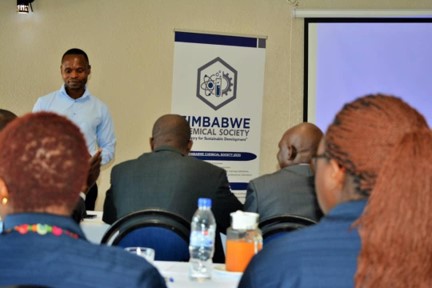High level Technical dialogue: Where is Chemistry?

The session was chaired by Dr Mehlana, he started by giving remarks on where is chemistry at national and global level. The conference noted with concern that chemistry is not taking much role to play in safeguarding the national resources citing the exportation of raw co-existence of minerals and nothing was done on the adoption and implementation of green chemistry concepts in Zimbabwe. It was also noted that International Union of Pure and Applied Chemistry (IUPAC) had proposed that all hazardous chemical process be stopped of which some had already been adopted by UN. However, in Zimbabwe, chemists are quiet, they are even not participating at decision making meetings where such things should be brought to national attention.
The conference resolved that ZCS supported by MHTE & STD must make chemistry visible and take a lead in influencing decision make for the better of every Zimbabwean and the nation at large. Chemists were encouraged to actively participate on national programs and provide scientific solutions to critical sectors such as water treatment, agricultural programs as well as in manufacturing and processing industries as part of decision makers. Chemists should be seen at national disaster response team such as Cyclone Idai Disaster, there are a lot chemist should have provided and still yet to be provided.
The conference resolved that chemistry development should start at ordinal and advanced levels. ZCS together with department of science and technology development under MHTE & STD in conjunction with ministry of primary and secondary education should introduce chemistry competitions and chemistry Olympiads with outstanding groups or individuals be given awards during Annual ZCS Awards giving ceremonies.
Tertiary institutions were also encouraged to revise and align their curriculum to promote the objectives of 5.0 education system by promoting teaching to produce or teach to plough back to the community concept. This can be achieved by offering practicals which involves making products, addressing individuals or national problems such as determining farming land’s pH and soil mineralogy and advice farmers on fertiliser requirement. Institutions can partner local authorities and use student practicals to determine water sources contaminants and also how to get rid of them during water treatment process. This can be done at polytechnics and undergraduate level. At postgraduate level, students are expected to come up with new products for removing those identified contaminants at a lower cost. This model of education will not produce academically talented cadres only but industrialists, practitioners with problem identification and solving skills, who can make good use of natural resources to generate money. Chemists are professionals who can generate money from any material. If the nation wants to generate money, we should adopt the system introduced in China where scientists and engineers were appointed in key areas where they can generate money. China developed drastically from third world class to surpass those that were regarded as first world class though China still claiming that it is still a developing country.
ZCS was tasked to gather all academic and professional research work that was published and develop the national database, some of those published work contains solutions to current economic challenges. This database will give the nation a baseline about where to start planning and how to execute various national activities. Besides the database, ZCS was tasked to establish the journal for publishing research findings from both academic and industrial research activities.
The conference encouraged women to take part in science activities. The society will promote their participation by introducing women conferences and chemistry talks at various platforms and different levels.
